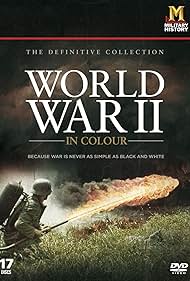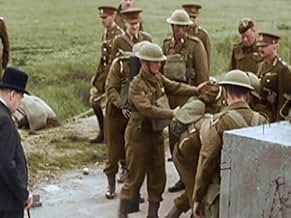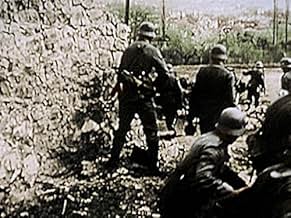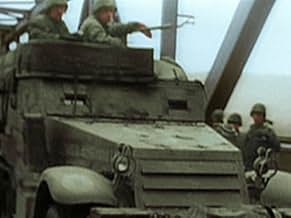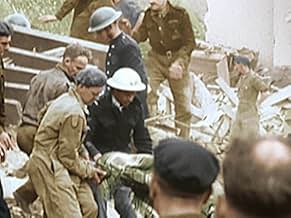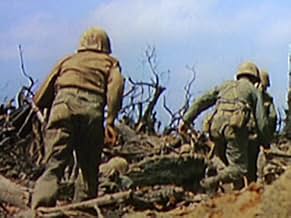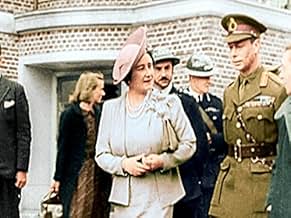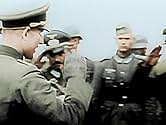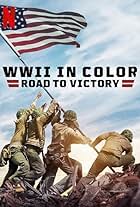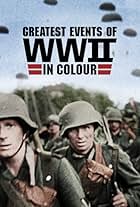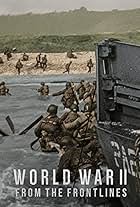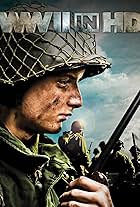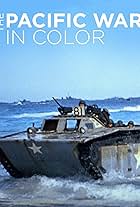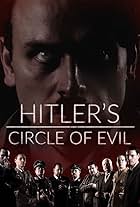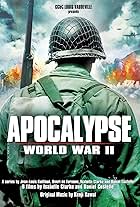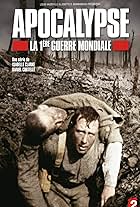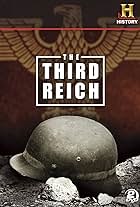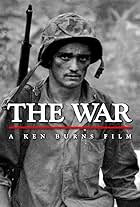IMDb RATING
8.7/10
7.8K
YOUR RATING
Recounts the events of world War II in color.Recounts the events of world War II in color.Recounts the events of world War II in color.
8.4/10
Top-rated
Fri, Nov 12, 2010
- S1.E1
- The Gathering Storm
The activities of nations after World War I that lead to World War II.
8.3/10
Browse episodes
Featured reviews
Short and not overwhelming. Great for anyone that's interested in the second World War.
For the first time you can actually view footage from the war in color
Spectacular for anyone ages 13-100
some violent footage is in it so if you're sensitive you might have to reconsider.
Maps are really fascinating and well done.
Robert Powell also does a fantastic job. His accent makes everything simple to understand.
IS IT GOOD FOR EDUCATION?
Yes. It's amazing for education since the episodes cover everything from A-Z.
My favorite segment is the "battle of the islands" where they talk about America vs Japan. Probably my favorite segment because it has tons of footage in it.
For the first time you can actually view footage from the war in color
Spectacular for anyone ages 13-100
some violent footage is in it so if you're sensitive you might have to reconsider.
Maps are really fascinating and well done.
Robert Powell also does a fantastic job. His accent makes everything simple to understand.
IS IT GOOD FOR EDUCATION?
Yes. It's amazing for education since the episodes cover everything from A-Z.
My favorite segment is the "battle of the islands" where they talk about America vs Japan. Probably my favorite segment because it has tons of footage in it.
The video quality has been brought up to a near 1970's quality and after a while you start taking it for granted.
This is an educational series with narration all the way through, in near chronological order with clear maps showing how the front line of the battles moved around europe, Africa and asia.
There has been unfair reviews saying that the series favours the British efforts of the war and perhaps it does as the series was probably compiled in Britain. You have to remember though that they are only covering the footage that they have from the war and Britain was fighting the war in Europe single handedly for a couple of years, whilst fighting in Africa and Asia. The red army probably played a bigger part towards defeating Germany and to be fair this series does cover this quite well in 2 whole episodes.
History buffs will enjoy the footage but criticise small details that are incorrect. However, if you have limited knowledge of the war and the order of some of the main events then this is a good place to start to understand the history.
This is an educational series with narration all the way through, in near chronological order with clear maps showing how the front line of the battles moved around europe, Africa and asia.
There has been unfair reviews saying that the series favours the British efforts of the war and perhaps it does as the series was probably compiled in Britain. You have to remember though that they are only covering the footage that they have from the war and Britain was fighting the war in Europe single handedly for a couple of years, whilst fighting in Africa and Asia. The red army probably played a bigger part towards defeating Germany and to be fair this series does cover this quite well in 2 whole episodes.
History buffs will enjoy the footage but criticise small details that are incorrect. However, if you have limited knowledge of the war and the order of some of the main events then this is a good place to start to understand the history.
This long TV series, narrated by Robert Powell, whose tone expresses earnest and dispassionate interest, deals with World War II both in the East and West. I will now present you with a detailed history of the war in its entirety, along with an extensive psychoanalytic analysis of every person involved. Not just the principals but my Uncle Flory who was a corporal in the infantry, Hockey who was an aviation ordnance man in the Navy, a German guy I met in a bar in Italy who had served in the Wehrmacht on the Russian front, and my father-in-law who was an air raid warden in Philadelphia. Well, I would if I could but I can't.
Let's summarize it this way, just for the kids: Germany, Italy, and Japan start World War II around 1939. On the other side, the chief allies are Britain, Russia, and the USA. It was a terrible conflict. We won. I'll make just a few observations.
Some of the footage is familiar from black and white documentaries, but the colorization process has advanced since the earlier, crude attempts by Ted Turner and others. The viewer hardly notices the effects after a while.
It's interesting to compare the TV documentaries about the war from the perspective of their public appearance. In early series, like "Victory at Sea" (1952), only seven years after the end of the war, the enemy is still faceless and brutal. The insults may be subtle but palpable. Listen to the narrator's pronunciation of "the Japanese", with it's built-in sneer bespeaking disgust. Later, "The World At War" (1973) regards the war itself as appalling, an emotional experience as much as anything else. Olivier's narration is mournful. By the time of this documentary (2009), the war is treated as an awesome and terrible historic event, but one that can be looked at almost as moves in a geopolitical chess game. We still see corpses, the suffering of civilians, and we hear of the atrocities, but not nearly so often as earlier, and the narrator, Robert Powell, describes the goings on as if reading from a technical manual. The barely masked loathing of "Victory at Sea" is absent, and so are Olivier's tones of tired resignation.
The historical introduction to the beginning of the war in both theaters is nicely sketched in. And the description of events is sort of smoothed over and audience friendly. None of the battles is described in much detail. Controversy is avoided. Not much in the way of personalities either, except for a handful at the very top who are concisely introduced. If the Americans landed at Salerno and were saved from defeat only by naval gunfire -- well, "the Americans landed at Salerno." Did we bomb the fifth-century Benedictine monastery atop Monte Cassino, even though it was not occupied by German troops? Yes. "Out of desperation, the Allies bombed the monastery Monte Cassino" -- period. Did George Patton and Bernard Montgomery loathe each other? This space deliberately left blank.
The lacunae mask no essential points, but some of them are interesting or amusing in themselves. And, facing facts, some of the information left out is as important as what's left in. The "battle of Britain" is hardly mentioned. In Rommel's back-and-forth battles with the British across North Africa, not nearly enough emphasis is placed on logistics, which favored the Allied forces. They could be supplied through Egypt. Rommel, however, was dependent for the importing of essential supplies on one port, Tripoli. His fuel, food, water, replacements, and matériel passed through Tripoli. The supplies were shipped from Italy, a thousand miles across the Mediterranean Sea. Then, during Rommel's advances, they had to be schlepped across another thousand or more miles on a single desert road open to air attack. On top of that, the Brits had cracked the Italian naval code and knew when the transports would leave their ports in Italy. The transports were routinely sunk by Allied air and submarines, so virtually nothing was reaching Rommel. By the end, he was draining the fuel from some of his few remaining tanks in order to keep a handful of others operational.
The deciphering of Italy's naval code was kept so secret that in one instance an air attack was launched on a transport. The airplanes were already in sight of the target when it was discovered that the ship was carrying Allied POWs. The attack was never canceled. If it had been, it would have given away the game. I find details like these interesting. Maybe the producers did too but there simply wasn't room enough for them.
Some of the material not mentioned, like the American fighting spirit at Kasserine Pass, might just as well be forgotten. Overall, and considering the weight of the subject, it's quite well done.
Let's summarize it this way, just for the kids: Germany, Italy, and Japan start World War II around 1939. On the other side, the chief allies are Britain, Russia, and the USA. It was a terrible conflict. We won. I'll make just a few observations.
Some of the footage is familiar from black and white documentaries, but the colorization process has advanced since the earlier, crude attempts by Ted Turner and others. The viewer hardly notices the effects after a while.
It's interesting to compare the TV documentaries about the war from the perspective of their public appearance. In early series, like "Victory at Sea" (1952), only seven years after the end of the war, the enemy is still faceless and brutal. The insults may be subtle but palpable. Listen to the narrator's pronunciation of "the Japanese", with it's built-in sneer bespeaking disgust. Later, "The World At War" (1973) regards the war itself as appalling, an emotional experience as much as anything else. Olivier's narration is mournful. By the time of this documentary (2009), the war is treated as an awesome and terrible historic event, but one that can be looked at almost as moves in a geopolitical chess game. We still see corpses, the suffering of civilians, and we hear of the atrocities, but not nearly so often as earlier, and the narrator, Robert Powell, describes the goings on as if reading from a technical manual. The barely masked loathing of "Victory at Sea" is absent, and so are Olivier's tones of tired resignation.
The historical introduction to the beginning of the war in both theaters is nicely sketched in. And the description of events is sort of smoothed over and audience friendly. None of the battles is described in much detail. Controversy is avoided. Not much in the way of personalities either, except for a handful at the very top who are concisely introduced. If the Americans landed at Salerno and were saved from defeat only by naval gunfire -- well, "the Americans landed at Salerno." Did we bomb the fifth-century Benedictine monastery atop Monte Cassino, even though it was not occupied by German troops? Yes. "Out of desperation, the Allies bombed the monastery Monte Cassino" -- period. Did George Patton and Bernard Montgomery loathe each other? This space deliberately left blank.
The lacunae mask no essential points, but some of them are interesting or amusing in themselves. And, facing facts, some of the information left out is as important as what's left in. The "battle of Britain" is hardly mentioned. In Rommel's back-and-forth battles with the British across North Africa, not nearly enough emphasis is placed on logistics, which favored the Allied forces. They could be supplied through Egypt. Rommel, however, was dependent for the importing of essential supplies on one port, Tripoli. His fuel, food, water, replacements, and matériel passed through Tripoli. The supplies were shipped from Italy, a thousand miles across the Mediterranean Sea. Then, during Rommel's advances, they had to be schlepped across another thousand or more miles on a single desert road open to air attack. On top of that, the Brits had cracked the Italian naval code and knew when the transports would leave their ports in Italy. The transports were routinely sunk by Allied air and submarines, so virtually nothing was reaching Rommel. By the end, he was draining the fuel from some of his few remaining tanks in order to keep a handful of others operational.
The deciphering of Italy's naval code was kept so secret that in one instance an air attack was launched on a transport. The airplanes were already in sight of the target when it was discovered that the ship was carrying Allied POWs. The attack was never canceled. If it had been, it would have given away the game. I find details like these interesting. Maybe the producers did too but there simply wasn't room enough for them.
Some of the material not mentioned, like the American fighting spirit at Kasserine Pass, might just as well be forgotten. Overall, and considering the weight of the subject, it's quite well done.
A cursory review of a series which is quite the opposite; WWII In Color is an awe-inspiring look into the second world war which provides the viewer with a comprehensive understanding of the events of WWII through narration and colorized video. This series ― narrated by Robert Powell ― covers the entirety of WWII from precursory events which would kick-start the war, to Japan's surrender and the beginning of the Cold War. In an already academically intense genre, World War II in HD Color not only meets high expectations, but exceeds them entirely. Easy to pick up, this well-researched series condenses the war into a few episode's worth of educational content. Robert Powell's delivery in narrating vital moments in the war is perfectly done as his talent shows in such a way that the viewer will surely feel the emotion behind each and every catastrophic event. Furthermore, the footage is truly moving accompanied by the expert narration which includes: devastating footage of a holocaust concentration camp, adrenaline-filled battles, convening of world leaders and more, accompanied by geographic animations, the colorized footage is sure to leave an impact. In essence, this 5 star, extremely detailed and historically accurate series will ensure you come away with nothing less than a complete understanding of many events in the Eastern and Western Fronts, the North African Campaign, and the Pacific War via colorized video and emotionally moving narration.
This show demonstrate how unreliable human being are and how far they go due to their incomplete and sometimes wrong believes.
Going through the events occurred during WW II over and over again coming to conclusion that human will eventually destroy itself is inevitable.
The irony is human being having concerns regarding artificial intelligence and machine controlling human life. Yet that could be the only solution to not let human being destroy itself.
All these events happen about a century ago and still we see several evidences, that even up to presidential level of super power countries acting the same if not worse and supported by millions of people.
Seriously, we should not only let but beg machines to save us from ourselves before it is too late.
Going through the events occurred during WW II over and over again coming to conclusion that human will eventually destroy itself is inevitable.
The irony is human being having concerns regarding artificial intelligence and machine controlling human life. Yet that could be the only solution to not let human being destroy itself.
All these events happen about a century ago and still we see several evidences, that even up to presidential level of super power countries acting the same if not worse and supported by millions of people.
Seriously, we should not only let but beg machines to save us from ourselves before it is too late.
Did you know
- TriviaThough not listed among crew, the show credits Blair Wallace as colourist for the series.
- ConnectionsFeatured in History Buffs: Saving Private Ryan (2016)
- How many seasons does World War II in Colour have?Powered by Alexa
Details
- Release date
- Country of origin
- Language
- Also known as
- World War 2 in HD Colour
- Production companies
- See more company credits at IMDbPro
- Runtime51 minutes
- Color
- Aspect ratio
- 16 : 9
Contribute to this page
Suggest an edit or add missing content

